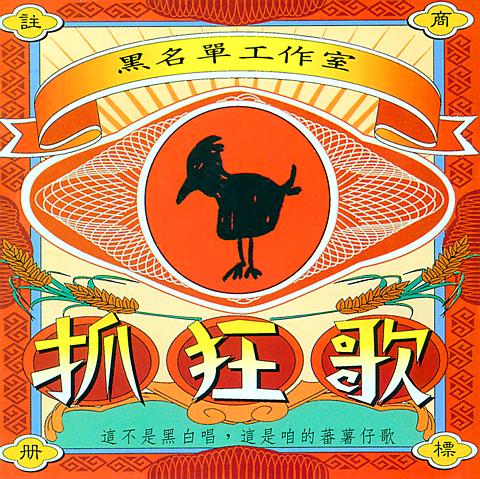Musician Joe Wang (王明輝) remembers 1989 well. Political demonstrations brought turmoil to Taiwan society. Long-suppressed social forces were being released from long-term dictatorship. And the first official opposition party -- the DPP -- was using a strategy of protest to clash with the KMT regime.
It was also the year that an unprecedented Taiwanese language album appeared on the market, titled Songs of Madness (抓狂歌) and subtitled "These aren't crap songs, these are our yam songs" (yam is a symbol of Taiwan). It was produced by Black List (黑名單工作室) -- comprised of Wang, Io Chen (陳主惠) and Keith Stewart from the US. The album recruited then underground singers such as Chen Ming-chang (陳明章) and Lin Wei-tseh (林瑋哲). The "mad songs" in the album mainly satirized the political situation at that time and ridiculed people's powerlessness in a hyper but chaotic society.
For example, in "Democracy Bumpkin" (民主阿草):

I went strolling in the morning, seeing troops of armed policemen, wondering if they were preparing to fight communists.
My neighbor told me it was against protesters. He said he is something called DPP and it's fun to protest.
There were a bunch of old guys occupying seats in the congress, using our tax money for their medical fees. There were old mainlanders serving the country for 40 years but gaining nothing. I want to protest. I want to protest, they shouted.
"We wanted to record the happenings of Taiwan's society and provide a space for people to think -- through music," Wang recalls. When it comes to protest singers or bands, one might think of Bob Dylan in the 60s, the UK's Billy Bragg in the 80s or Rage Against the Machine in the 90s. In Taiwan, in the late 80s and early 90s, it was Black List and its frontman Joe Wang.
For Wang, Black List's role was to find a way for intellectuals to intervene through music. "Since Lo Ta-yu (羅大佑) in the early 80s, [who sang "Lukang Small Town"], we had not heard an intellectual's voice in the music scene," he says. "For us, we didn't quite believe in sentimental inspiration when we wrote music."
Songs of Madness breaks down the convention of Taiwanese language pop songs, which contain exaggerated elements of lament, either about lost love or good times that can't be relived. But Black List's social criticism cloaked in cynical Taiwanese rap and folk songs, which soon became popular among college students and young middle class. Songs of Madness was labeled by media and critics as the New Taiwanese Songs. Soon, Chen Ming-chang and Lin Wei-tseh became popular songwriters and producers. Chen wrote and produced many award-winning scores for director Ho Hsiao-hsien (侯孝賢) and Lin is now producer of the award-winning singer Faith Yang (楊乃文). But for Wang, who insists on staying aloof from the mainstream, he knew that the New Taiwanese Song movement was no more than a market gimmick. "After Chiang Hui (江蕙) swept away KTV hit rate, the mainstream started to embrace sentiment ballads again," he said.
Wang didn't stop producing alternative music during the 10 years following Songs of Madness, a period during which his star has slowly dimmed. Gradually, Taiwanese language diminished as an essential tool of protest, so Wang shifted his focus to other subjects of social struggle -- for instance, labor and aboriginal issues. "We [Black List] are the only group who cares about the issue of class in Taiwan society," Wang says.

April 14 to April 20 In March 1947, Sising Katadrepan urged the government to drop the “high mountain people” (高山族) designation for Indigenous Taiwanese and refer to them as “Taiwan people” (台灣族). He considered the term derogatory, arguing that it made them sound like animals. The Taiwan Provincial Government agreed to stop using the term, stating that Indigenous Taiwanese suffered all sorts of discrimination and oppression under the Japanese and were forced to live in the mountains as outsiders to society. Now, under the new regime, they would be seen as equals, thus they should be henceforth

Last week, the the National Immigration Agency (NIA) told the legislature that more than 10,000 naturalized Taiwanese citizens from the People’s Republic of China (PRC) risked having their citizenship revoked if they failed to provide proof that they had renounced their Chinese household registration within the next three months. Renunciation is required under the Act Governing Relations Between the People of the Taiwan Area and the Mainland Area (臺灣地區與大陸地區人民關係條例), as amended in 2004, though it was only a legal requirement after 2000. Prior to that, it had been only an administrative requirement since the Nationality Act (國籍法) was established in

With over 80 works on display, this is Louise Bourgeois’ first solo show in Taiwan. Visitors are invited to traverse her world of love and hate, vengeance and acceptance, trauma and reconciliation. Dominating the entrance, the nine-foot-tall Crouching Spider (2003) greets visitors. The creature looms behind the glass facade, symbolic protector and gatekeeper to the intimate journey ahead. Bourgeois, best known for her giant spider sculptures, is one of the most influential artist of the twentieth century. Blending vulnerability and defiance through themes of sexuality, trauma and identity, her work reshaped the landscape of contemporary art with fearless honesty. “People are influenced by

The remains of this Japanese-era trail designed to protect the camphor industry make for a scenic day-hike, a fascinating overnight hike or a challenging multi-day adventure Maolin District (茂林) in Kaohsiung is well known for beautiful roadside scenery, waterfalls, the annual butterfly migration and indigenous culture. A lesser known but worthwhile destination here lies along the very top of the valley: the Liugui Security Path (六龜警備道). This relic of the Japanese era once isolated the Maolin valley from the outside world but now serves to draw tourists in. The path originally ran for about 50km, but not all of this trail is still easily walkable. The nicest section for a simple day hike is the heavily trafficked southern section above Maolin and Wanshan (萬山) villages. Remains of